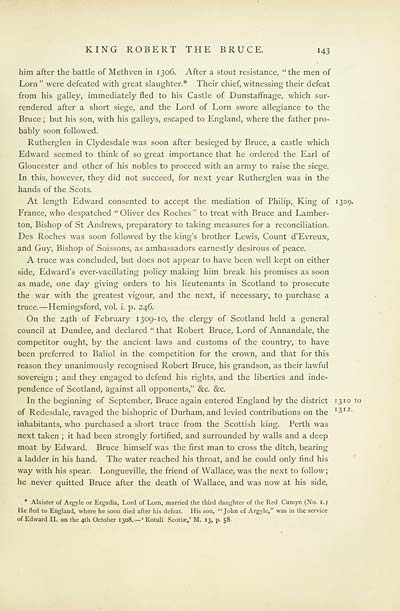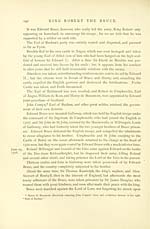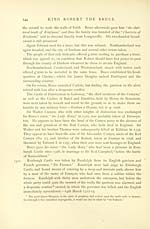Family records of the Bruces and the Cumyns
(155) Page 143
Download files
Complete book:
Individual page:
Thumbnail gallery: Grid view | List view

KING ROBERT THE BRUCE. 143
him after the battle of Methven in 1306. After a stout resistance, "the men of
Lorn " were defeated with great slaughter.* Their chief, witnessing their defeat
from his galley, immediately fled to his Castle of Dunstaffnage, which sur-
rendered after a short siege, and the Lord of Lorn swore allegiance to the
Bruce ; but his son, with his galleys, escaped to England, where the father pro-
bably soon followed.
Rutherglen in Clydesdale was soon after besieged by Bruce, a castle which
Edward seemed to think of so great importance that he ordered the Earl of
Gloucester and other of his nobles to proceed with an army to raise the siege.
In this, however, they did not succeed, for next year Rutherglen was in the
hands of the Scots.
At length Edward consented to accept the mediation of Philip, King of 1309.
France, who despatched " Oliver des Roches " to treat with Bruce and Lamber-
ton, Bishop of St Andrews, preparatory to taking measures for a reconciliation.
Des Roches was soon followed by the king's brother Lewis, Count d'Evreux,
and Guy, Bishop of Soissons, as ambassadors earnestly desirous of peace.
A truce was concluded, but does not appear to have been well kept on either
side, Edward's ever-vacillating policy making him break his promises as soon
as made, one day giving orders to his lieutenants in Scotland to prosecute
the war with the greatest vigour, and the next, if necessary, to purchase a
truce. — Hemingsford, vol. i. p. 246.
On the 24th of February 1309-10, the clergy of Scotland held a general
council at Dundee, and declared " that Robert Bruce, Lord of Annandale, the
competitor ought, by the ancient laws and customs of the country, to have
been preferred to Baliol in the competition for the crown, and that for this
reason they unanimously recognised Robert Bruce, his grandson, as their lawful
sovereign ; and they engaged to defend his rights, and the liberties and inde-
pendence of Scotland, against all opponents," &c. &c.
In the beginning of September, Bruce again entered England by the district 13 10 to
of Redesdale, ravaged the bishopric of Durham, and levied contributions on the * "
inhabitants, who purchased a short truce from the Scottish king. Perth was
next taken ; it had been strongly fortified, and surrounded by walls and a deep
moat by Edward. Bruce himself was the first man to cross the ditch, bearing
a ladder in his hand. The water reached his throat, and he could only find his
way with his spear. Longueville, the friend of Wallace, was the next to follow ;
he never quitted Bruce after the death of Wallace, and was now at his side,
* Alaister of Argyle or Ergadia, Lord of Lorn, married the third daughter of the Red Cumyrs (No. I.)
He fled to England, where he soon died after his defeat. His son, "John of Argyle," was in the service
of Edward II. on the 4th October 1308.—' Rotuli Scotiae,' M. 13, p. 58,
him after the battle of Methven in 1306. After a stout resistance, "the men of
Lorn " were defeated with great slaughter.* Their chief, witnessing their defeat
from his galley, immediately fled to his Castle of Dunstaffnage, which sur-
rendered after a short siege, and the Lord of Lorn swore allegiance to the
Bruce ; but his son, with his galleys, escaped to England, where the father pro-
bably soon followed.
Rutherglen in Clydesdale was soon after besieged by Bruce, a castle which
Edward seemed to think of so great importance that he ordered the Earl of
Gloucester and other of his nobles to proceed with an army to raise the siege.
In this, however, they did not succeed, for next year Rutherglen was in the
hands of the Scots.
At length Edward consented to accept the mediation of Philip, King of 1309.
France, who despatched " Oliver des Roches " to treat with Bruce and Lamber-
ton, Bishop of St Andrews, preparatory to taking measures for a reconciliation.
Des Roches was soon followed by the king's brother Lewis, Count d'Evreux,
and Guy, Bishop of Soissons, as ambassadors earnestly desirous of peace.
A truce was concluded, but does not appear to have been well kept on either
side, Edward's ever-vacillating policy making him break his promises as soon
as made, one day giving orders to his lieutenants in Scotland to prosecute
the war with the greatest vigour, and the next, if necessary, to purchase a
truce. — Hemingsford, vol. i. p. 246.
On the 24th of February 1309-10, the clergy of Scotland held a general
council at Dundee, and declared " that Robert Bruce, Lord of Annandale, the
competitor ought, by the ancient laws and customs of the country, to have
been preferred to Baliol in the competition for the crown, and that for this
reason they unanimously recognised Robert Bruce, his grandson, as their lawful
sovereign ; and they engaged to defend his rights, and the liberties and inde-
pendence of Scotland, against all opponents," &c. &c.
In the beginning of September, Bruce again entered England by the district 13 10 to
of Redesdale, ravaged the bishopric of Durham, and levied contributions on the * "
inhabitants, who purchased a short truce from the Scottish king. Perth was
next taken ; it had been strongly fortified, and surrounded by walls and a deep
moat by Edward. Bruce himself was the first man to cross the ditch, bearing
a ladder in his hand. The water reached his throat, and he could only find his
way with his spear. Longueville, the friend of Wallace, was the next to follow ;
he never quitted Bruce after the death of Wallace, and was now at his side,
* Alaister of Argyle or Ergadia, Lord of Lorn, married the third daughter of the Red Cumyrs (No. I.)
He fled to England, where he soon died after his defeat. His son, "John of Argyle," was in the service
of Edward II. on the 4th October 1308.—' Rotuli Scotiae,' M. 13, p. 58,
Set display mode to:
![]() Universal Viewer |
Universal Viewer | ![]() Mirador |
Large image | Transcription
Mirador |
Large image | Transcription
Images and transcriptions on this page, including medium image downloads, may be used under the Creative Commons Attribution 4.0 International Licence unless otherwise stated. ![]()
| Histories of Scottish families > Family records of the Bruces and the Cumyns > (155) Page 143 |
|---|
| Permanent URL | https://digital.nls.uk/95072846 |
|---|
| Description | A selection of almost 400 printed items relating to the history of Scottish families, mostly dating from the 19th and early 20th centuries. Includes memoirs, genealogies and clan histories, with a few produced by emigrant families. The earliest family history goes back to AD 916. |
|---|

